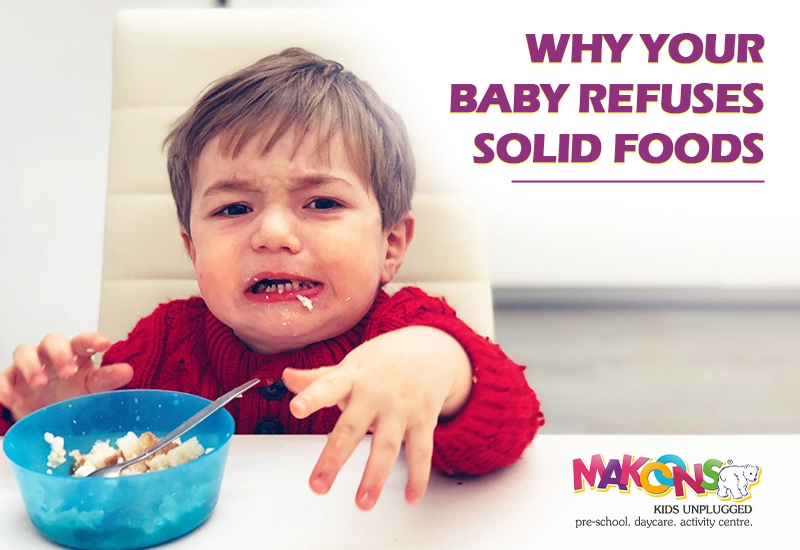As a new parent, you have probably been waiting impatiently for the turning point of feeding your infant solid foods. You set up the high chair, got lovely small utensils, and made healthy purees. When your child firmly closes their mouth, turns their head away, or Vomiting in infants, though, what happens? Your frustrating situation is not unique if your child rejects solid meals.
Understanding Why Your Baby Not Eating Solids
A major developmental leap is taken from an all-liquid diet to solids. Babies usually display readiness signals between four to six months for including supplemental foods alongside breast milk or formula. Many parents, nevertheless, run across opposition throughout this change. Let’s investigate the typical causes of infant refusal of solid foods.
Developmental Periodicity
Every young infant grows at their own speed. Although recommendations call for beginning solids about six months, your kid might just require extra time. Some infants lack developmental readiness until nearer seven or eight months. Early pushing runs the danger of causing opposition.
Texture Sensibility
One of the most often occurring causes of baby rejection of solid foods is texture aversion. Your child’s food experience goes beyond taste; it is a whole sensory experience including texture, temperature, and consistency. When switching from smooth purees to more textured foods, many newborns find lumpy textures very unpleasant.
Growing children have to learn how to regulate several food textures in their mouths.. This calls for slow-developing new oral motor abilities. Taste preferences call for various tongue motions in a smooth puree than in a mushy finger snack or mashed banana with little lumps.
Think about breast milk; babies are born with a taste for sweet flavours and may first reject sour or bitter tastes found in many veggies. This merely signifies your baby’s taste is growing; it does not mean she will always detest certain meals.
Medical Concerns
Sometimes physical problems cause food refusal:
- Teething pain
- Oral motor problems including tongue tie
- Reflux or intestinal sensitivity
- trouble swallowing
See your paediatrician for assessment if you suspect any of these problems.
Claiming Independence
Growing babies start showing preferences and exercising control. Sometimes food rejection is more about exercise of newly acquired freedom than about the food itself.
Effective Baby Feeding Tips for Reluctant Eaters–
These techniques can help break through resistance during lunchtime battles:
1. Honour Their Chronology
Steer clear of forcing your child to eat. Force-feeding can aggravate food rejection and produce bad connections with mealtimes. Remember that solid foods are extra since for infants under one year, breast milk or formula still provides their major source of nutrition.
2. Begin with appropriate textures.
Should your newborn show sensitivity to texture:
- Start with absolutely perfect purees.
- Introduce progressively thicker consistency gradually.
- Note which textures your child finds most pleasing.
- Try several cooking techniques; roasting and steaming will have quite distinct textures.
3. Perfect Practice Makes All Difference
Babies could need 10–15 experiences with a new food before they accept it.The secret is constant, pressure-free exposure.
- Offer little quantities often.
- Allow hands to be used in messy exploring.
- Model enjoying these foods personally.
- Create a laid-back, pleasant dinner environment.
4. Temperature Counts
Some infants show great preferences for food temperature. To find out what your baby likes, try presenting meals at various temperatures—ensuring they are safe, of course.
5. Timing Rules Everything.
Willingness to try new foods is much influenced by hunger:
- When the infant is totally satisfied, do not serve food right away after milk.
- Discover the sweet spot whereby the infant feels frustrated but not unduly hungry.
- Watch how naturally hungry your kid is and modify accordingly.
6. Make It Social
Babies pick their skills by observation. Family dinners where kids can observe others consuming and enjoying food foster good memories.
- Eat together whenever you can.
- Show passion for nutritious foods.
- Discuss basic, positive terminology for textures and flavours.
7. Give Baby-Led Weaning some thought.
Certain texture-sensitive infants really rather than being spoon-fed prefer self-feeding with suitable finger foods. This method lets children explore at their own speed and provides them control over what they put into their mouths.
Appropriate first finger fare consists in:
- Rotten, soft avocado strips
- Vegetable sticks steamed to soft enough consistency to squish between your fingers.
- Strata of soft fruit, such as banana or ripe pear
- Pasta chunks that have been well fried
When Should Parents Seek Help for Picky Eaters?
Although some food rejection is typical during development, other indicators call for professional intervention:
- Loss of weight or inadequate weight increase
- Gagging, choking, or trouble swallowing.
- great pain during attempts at eating
- Avoiding all kinds of solid foods past nine months
- Pain following a meal: indicators
Your paediatrician can evaluate whether underlying conditions such oral motor impairments, digestive concerns, or sensory processing difficulties call for specific help.
Also Read –Top 10 Superfoods for Kids to boost Immune System Naturally
Conclusion
The road to solid foods is simply that—a road. While some newborns investigate new textures and flavours with trepidation, others grab solids passionately from the first bite. Neither strategy suggests the long-term direction of their relationship with food.
More important than your baby’s speed of solids acceptance is your calm, consistent attitude. Positive mealtime experiences free from pressure help to set the basis for lifetime of good eating practices.
The good news is that Most infants who first object to solid foods finally embrace a diversified diet with patience and suitable help. This difficult period does pass, and your tenacity with soft encouragement will pay off over time.
Remember these tips for picky eaters babies and know that with patience, most babies who initially refuse solid food will eventually embrace a varied diet.


